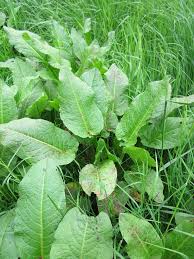Dock speciesBroad-leaved dock ( Rumex obtusifolius) Curled dock ( R.crispus)
Wood dock (R.sanguineus) Clustered dock (R.conglomeratus) Common Name: Dock Latin : Rumex obtusifolius Family: Polygonaceae (buckwheat family) History and/or use:. Juice of plant excellent for bites and stings and root rich in iron. Wildlife Value: Key butterfly food plant especially for the small copper. Qualities of Dock 'No landscape that I have seen holds anything truly dead or dull, or any trace of what is called in manufactories is called rubbish or waste; everything is perfectly clean and pure and full of divine lessons. When we try to pick out anything by itself, we find it hitched to everything else in the universe. ' John Muir Dock is a survivor it produces thousands of seeds and can grow from the tinniest root left in the ground. Plants such as this always come back despite the world trying to destroy them! However as you shall see below it has many uses and if it were not common would be a plant admired for its foliage and rust coloured flowers standing amongst the green sward. Dock therefore to paraphrase from the quote above despite being common is still 'full of divine lessons' providing foliage and sustenance for wildlife including humans. There are many species of dock but one often thinks of the broad-leaved when referring to it. The curled dock is the most commonly used for medicine today and the wood dock is the only species preferring the shade although will still grow in the open. Most of us have grown up with the idea of docks growing with nettles and it is indeed true that both these plants can grow together and often where humans have been for both plants crop up in cultivated and disturbed soils. The dock especially grows on soil which has been compacted by feet or machinery. Dock is known as the cure for the nettle sting and this extends to any burn, scald or blister as the juice of this plant has many healing properties. Ironstone quarry workers are said to have rubbed freshly cut dock on their forearm sores. Science is now implying dock is a placebo but Science is far behind Indigenous traditions when it comes to a knowledge of nature, I find dock incredibly effective especially when treating insect bites! If you have any medical conditions please check with a medical herbalist first before taking any plant and only harvest it if you are 100% sure what it is! Naturalists who have a love of the common species have been heard to dismiss this plant in a derogatory fashion but history has not done so. It is one of the four most commonly used herbs; elder, nettle and dandelion being the others. Its root is rich in iron and can be used to purify the blood and as a laxative. The bitter leaves are edible and traditionally used to wrap butter in. If you would like to support our work and go even more deeply into Nature Connection please become a member and have exclusive access to our online course.
2 Comments
11/13/2019 07:58:45 pm
The truth is, I am not really into plants and this is the very first time I've heard these names. Perhaps, I can see it at grandma's garden, but I just don't know its name! By the way, Broad-leaved dock is not just ordinary plant because it has its healing capacity. That could be the reason why my grandma has a lot of it because she uses for for several natural remedies every time her grandchildren is feeling a bit unease with ourselves before. Huge thanks for this article because I've learned a lot!
Reply
Leave a Reply. |
Details
Poetry of flowersJoin me to explore the flora of the British Isles on this blog. My intention is to attempt to capture the unique quality and beauty of each species of flower, tree or shrub. For every species featured I will be growing many more wildflowers to celebrate the joy of their existence, their intrinsic conservation value and bewildering array of uses. For nearly 30 years I have noted, studied and explored wildflowers in the field much to the patience of the walker beside me. To share this passion is a heartfelt plea to respect, preserve and care for all British Wildflowers no matter how common they seem. Archives
February 2024
Categories |


 RSS Feed
RSS Feed
